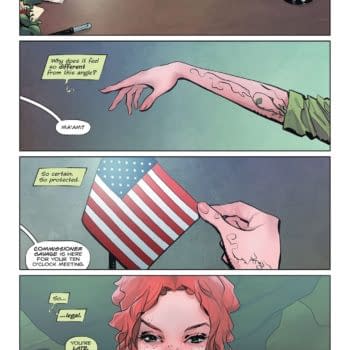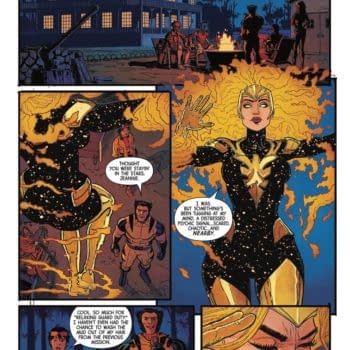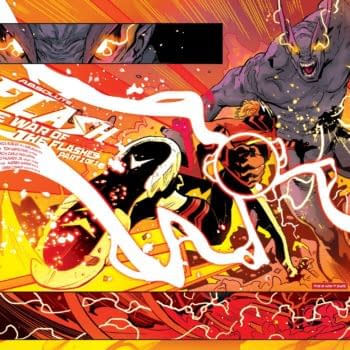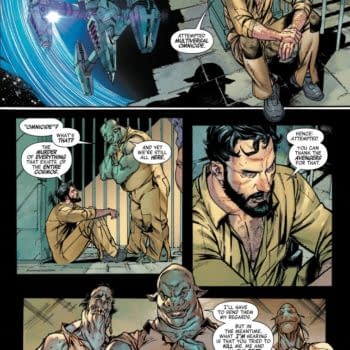Posted in: Comics, Recent Updates | Tagged: charlottesville, Comics, HRL
Peter David Explains Why The Charlottesville White Nationalists Shouldn't Be Fired
Peter David is a long-time comic book writer, famed for his work on X-Factor, Spider-Man 2099, Aquaman, Supergirl and Hulk, as well as being the writer of many Star Trek novels, movie adaptations and his own book series, writing for Babylon 5, Young Justice, and co-creator of TV show Space Cases. He is currently the writer of Ben Reilly, Scarlet Spider for Marvel Comics.

David has also been widely outspoken, his column But I Digress in the late Comics Buyers Guide saw him in conflict with Image Comics founders (leading to a debate in a boxing ring with Todd McFarlane), a longstanding enmity with Gary Groth and Fantagraphics Books, and a diatribe against Romani which he then had to backtrack on and apologise for, profusely.
At this point, it is also worth pointing out that he is Jewish and talks about his Jewish experience and that of his family in his writing a fair amount. And that his father and grandparents came to the USA in the 1930s, fleeing Nazi Germany. Of late, he has written much critical of Trump and his supporters.
But yesterday he talked about white nationalist marchers in Charlottesville being identified and fired from their place of work as a result. And he's not a fan:
"If all he did was open his mouth or wave a sign, I'm sorry, no. He shouldn't lose his job for that. He shouldn't be prosecuted for that. I mean, obviously it didn't interfere with his ability to do his job because his employer was fine with keeping him on as long as he didn't harass others with his views. But now they're being fired because their employer knows where his sympathies lie? That's just not right. For two reasons.
First of all, all it's going to do is drive him further underground. He might indeed start wearing a hood and, cloaked in anonymity, do worse things than he was already doing. His boss and fellow employees couldn't sit him down and say, "Why do you feel this way? Have you ever considered maybe you're wrong?" Engage in conversation that might change his mind (as unlikely as that may seem.).
And second, getting him fired is simply going to galvanize his hatred of the left. Before his reasons for prejudice were all lies that were fed to him by right wing sources. Now, though, he has a genuine reason to hate those who were opposed to him: they got him fired. They wrecked his life. What's to stop him from planning revenge against his enemies? What's to stop him from hopping behind the wheel of a car and running over some of those lefty bastards and exacting some payback? Before he was just an asshole. Now he's a genuine enemy.
It is NEVER a good idea to punish somebody just because you don't like their opinions."
That opinion is in line with the thoughts of French philosopher Voltaire, summarised by Beatrice Evelyn Hall: "I disapprove of what you say, but I will defend to the death your right to say it." Or, in this case, "I will defend to the death your right to still be employed at Costco." However, that kind of thinking, when applied to hate speech, has become less popular of late.
Especially, it seems, with some of David's followers. Those who commented on his blog were generally in agreement.
Jan: THANK YOU!! I keep sayting this every time the internet mob goes into doxxing mode. Yes, bigotry and hatred must be fought. But while it's popular to say 'freedom of speach doesn't mean freedom from consequences', I can only reply that the answer to free speach is more speach and that the concept of 'let the punishment fit the crime' should come back into style.
Luigi: Peter, I had been thinking the same exact thing.
David: I have similar feelings. I have said in the past, "The most dangerous kind of racist is an unemployed racist." Sort of tongue-in-cheek, but I do feel there's a kernel of truth to it. I used to say it specifically in reference to people getting fired from their jobs because of objectionable tweets.
Damian: I agree with you 100%. I am Irish, and in our constitution we are _not_ guaranteed freedom of speech in all cases, so it's something I've always greatly admired in your constitution, the First Amendment, it's such an amazingly powerful statement of individual freedom, and so admired all over the world. But it is also such a challenge, because it means you have to tolerate people whose ideas are repugnant to you.
But out in the wilds of Twitter, less so.
And I thought yesterday was going to be the controversial one.


















